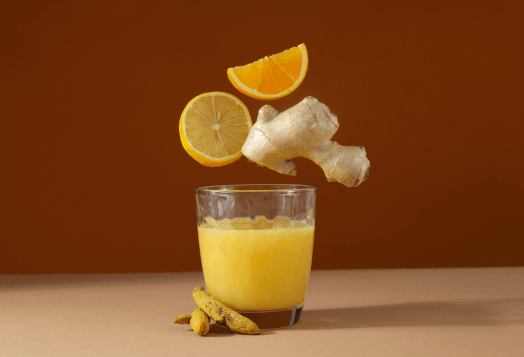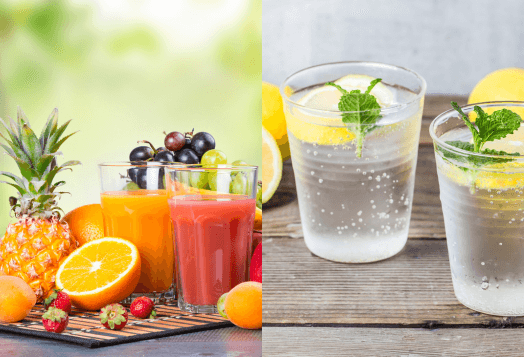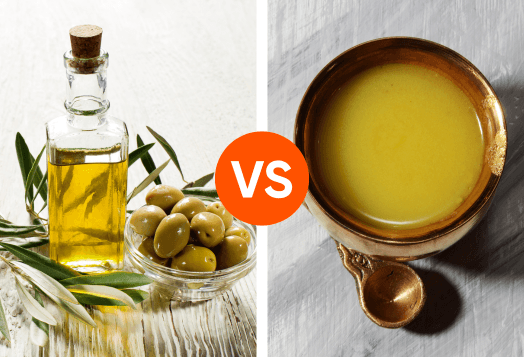Fruit juice is often seen as a smart, nutritious choice, especially when it’s labelled “100% natural.” But is fruit juice good for health in the long run? While it does offer vitamin C, antioxidants, and hydration, it’s also high in sugar and lacks fibre. Let’s understand the full picture. Are fruit juices healthy or simply a sweet illusion of wellness?
What’s Really Inside Your Glass? (Nutritional Facts of Fruit Juice)

Fruit juice is often seen as a healthy choice, but is it really? Are fruit juices good for you, or are they just sugary drinks in disguise? Let’s break it down..
1. Calories and Sugar Content
A serving of 100% fruit juice, like orange or apple, typically contains about 110 calories and 20–26 g of natural sugar, almost the same as soda. Despite being natural, this sugar can still impact blood sugar levels and overall health if consumed in large amounts.
2. Vitamins and Minerals
Juices offer vitamin C, potassium, folate, antioxidants and polyphenols, nutrients soda can’t touch. In small amounts (up to ~150 ml/day), some evidence links juice consumption to modest cardiovascular benefits.
3. Missing Fibre = Missing Benefits
Juicing removes pulp and with it, practically all fibre and bound phytonutrients. Fibre is essential to slow sugar absorption, support digestion and help you feel full.
4. Low Satiety Value
Unlike whole fruit, juice doesn’t fill you up. It’s easy to consume several servings’ worth of sugar without noticing, making moderation even more important.
5. Impact on Blood Sugar
Fruit juice causes quicker spikes in blood sugar compared to whole fruit. For people with diabetes or insulin resistance, this can be a concern.
6. Acidity and Dental Health
Citrus-based juices like orange or pineapple are acidic and may erode enamel. Drinking them often, especially without rinsing, can weaken teeth over time.
Juice ≠ Fruit, And Here’s Why:

When comparing whole fruit to its juiced version, fibre is the deciding factor. Whole fruit delivers fibre that slows sugar absorption, supports satiety and preserves intact phytonutrients. Meanwhile, fruit juice removes the pulp, leading to a sharper glycemic response and reduced feeling of fullness.
So, is fruit juice healthy? Only when consumed occasionally, and never as a complete replacement for whole fruits. Whole fruits also encourage mindful eating through chewing, which aids digestion and portion control. Juice, on the other hand, is easy to overconsume, especially when marketed as a ‘healthier’ drink.
Fruit Juice vs Soda: What’s Healthier?

Fruit juice and soda may seem equally sugary, but they impact your body very differently. That’s why many still wonder: Is fruit juice good for health, or just cleverly disguised sweetness? Here’s a quick cheat guide to help you sip smarter.
Feature | 100% Fruit Juice (e.g., Orange Juice) | Soda (e.g., Cola) |
Sugar Content | High (natural fructose) | High (added sugars like high-fructose corn syrup) |
Calories | High | High |
Vitamins | Present (e.g., Vitamin C, potassium) | None |
Minerals | Present | None |
Fibre | Absent | Absent |
Antioxidants | Present | None |
While both are high in sugar and low in fibre, fruit juice offers micronutrients, soda doesn’t, but only if consumed sparingly as part of a balanced workout nutrition plan.
Is Fruit Juice Good For Health? Pros and Cons
Fruit juice might seem like a shortcut to getting your daily nutrients, but there’s more to the story. Let’s break down the pros and cons so you can sip smarter every time.
The Pros of Fruit Juice
Fruit juice is a good source of essential nutrients like vitamin C, potassium, folate, and antioxidants that support immunity, heart health, and overall wellness when consumed mindfully.
Although not a direct substitute for whole fruit, a small portion (like 150 ml) of 100% fruit juice can count toward your daily fruit intake and is more hydrating than soda.
A study done by BMJ(British Medical Journal) linked moderate juice consumption to a reduced risk of cardiovascular disease, thanks to its polyphenol content and anti-inflammatory properties.
The Cons of Fruit Juice
A single 150 ml serving of fruit juice can contain as much sugar as soda, around 20–26 grams, raising concerns about weight gain and blood sugar impact.
Juicing removes almost all of the fruit's fibre, causing rapid sugar absorption, greater glycemic spikes, and less satiety compared to eating the whole fruit.
Excessive fruit juice intake has been associated with increased risk of obesity, type 2 diabetes, and dental issues, especially in children and adolescents.
How Much Fruit Juice Should You Drink?
Experts suggest no more than 125–150 ml (4–5 oz) of 100% fruit juice per day, preferably with meals, to reduce blood sugar spikes. While fruit juices are healthy in moderation, children under one shouldn’t have juice, and older children should have lower limits (≈120 ml or less). Drinking juice with meals helps slow sugar absorption and supports better nutrient balance.
Healthy Alternatives to Fruit Juice
Infused Water
Add fruit slices like lemon, berries or cucumber to water for flavour without sugar. It's refreshing, easy to prep, and helps increase your daily water intake.
Vegetable Juices
Low‑sugar, nutrient‑rich options such as kale‑carrot or tomato blends, watch for sodium content. These are great for adding antioxidants and micronutrients without spiking blood sugar.
Whole‑Fruit Smoothies
Blend whole fruit (with skins/pulp), vegetables, and healthy fats for full fibre and balanced nutrition, perfect for a 7-day diet plan for weight loss. Unlike juice, smoothies retain fibre that helps keep you fuller for longer.
So, Where Does Fruit Juice Fit In Your Diet?
Is fruit juice healthy? In short, yes, but only when enjoyed in moderation. While 100% fruit juice offers nutrients like vitamin C and potassium, its lack of fibre and high natural sugar content means it shouldn't replace whole fruit. Instead, think of it as an occasional, nutrient-dense snack, best served in small portions and paired with meals. Fruit juices are good for you only when consumed in the right balance with guidance from dietitians. With mindful portions, they can be part of a healthy lifestyle without tipping the scale toward excess.




